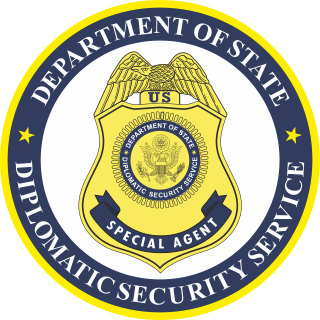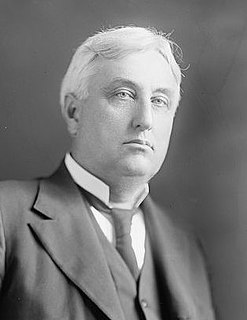
The United States Marshals Service (USMS) is a federal law enforcement agency in the United States. The USMS is a bureau within the U.S. Department of Justice, operating under the direction of the Attorney General, but serves as the enforcement arm of the United States federal courts to ensure the effective operation of the judiciary and integrity of the Constitution. It is the oldest U.S. federal law enforcement agency, created by the Judiciary Act of 1789 during the presidency of George Washington as the "Office of the United States Marshal". The USMS as it stands today was established in 1969 to provide guidance and assistance to U.S. Marshals throughout the federal judicial districts.
The U.S. Immigration and Customs Enforcement (ICE) is a federal law enforcement agency under the U.S. Department of Homeland Security. ICE's stated mission is to protect the United States from the cross-border crime and illegal immigration that threaten national security and public safety.

A bounty hunter is a private agent working for bail bonds who captures fugitives or criminals for a commission or bounty. The occupation, officially known as bail enforcement agent, or fugitive recovery agent, has traditionally operated outside the legal constraints that govern police officers and other agents of the state. This is because a bail agreement between a defendant and a bail bondsman is essentially a civil contract that is incumbent upon the bondsman to enforce. As a result, bounty hunters hired by a bail bondsman enjoy significant legal privileges, such as forcibly entering a defendant's home without probable cause or a search warrant; however, since they are not police officers, bounty hunters are legally exposed to liabilities that normally exempt agents of the state—as these immunities enable police to perform their designated functions effectively without fear—and everyday citizens approached by a bounty hunter are neither required to answer their questions nor allowed to be detained. Bounty hunters are typically independent contractors paid a commission of the total bail amount that is owed by the fugitive; they provide their own PLI and only get paid if they are able to find the "skip" and bring them in.

United States Customs and Border Protection (CBP) is the largest federal law enforcement agency of the United States Department of Homeland Security, and is the country's primary border control organization. It is charged with regulating and facilitating international trade, collecting import duties, and enforcing U.S. regulations, including trade, customs, and immigration. CBP is one of the largest law enforcement agencies in the United States. It has a workforce of more than 45,600 sworn federal agents and officers. It is headquartered in Washington, D.C.

The Bureau of Diplomatic Security, commonly known as Diplomatic Security (DS), is the security branch of the United States Department of State. It conducts international investigations, threat analysis, cyber security, counterterrorism, and protection of people, property, and information. Its mission is to provide a safe and secure environment for officials to carry out U.S. foreign policy.

The Diplomatic Security Service is a security and law enforcement agency that acts as the operational division of the Bureau of Diplomatic Security, which is a branch of the United States Department of State. Its primary mission is to protect diplomatic assets, personnel and information, as well as combat visa and passport fraud. The agency also undertakes counterterrorism, counterintelligence, cybersecurity and criminal investigations, both domestically and abroad.
A law enforcement officer (LEO), or peace officer in North American English, is a public-sector employee whose duties primarily involve the enforcement of laws. The phrase can include police officers, prosecutors, municipal law enforcement officers, special police officers, customs officers, state troopers, special agents, secret agents, special investigators, border patrol officers, immigration officers, court officers, probation officers, parole officers, arson investigators, auxiliary officers, game wardens, sheriffs, constables, marshals, deputies, detention officers, correction officers, sworn campus police officers and public safety officers. Security guards are civilians and therefore not law enforcement officers, unless they have been granted powers to enforce particular laws, such as those accredited under a community safety accreditation scheme such as a security police officer.

Game laws are statutes which regulate the right to pursue and take or kill certain kinds of fish and wild animal (game). Their scope can include the following: restricting the days to harvest fish or game, restricting the number of animals per person, restricting species harvested, and limiting weapons and fishing gear used. Hunters, fishermen and lawmakers generally agree that the purposes of such laws is to balance the needs for preservation and harvest and to manage both environment and populations of fish and game. Game laws can provide a legal structure to collect license fees and other money which is used to fund conservation efforts as well as to obtain harvest information used in wildlife management practice.

In the 1912 and 1913 United States Senate elections, Democrats gained control of the Senate from the Republicans. Of the 32 seats up for election, 17 were won by Democrats, thereby gaining 4 seats from the Republicans. Two seats were unfilled by state legislators who failed to elect a new senator on time. They were the last Senate elections held before ratification of the 17th Amendment, which established direct elections for all seats in the Senate.

The United States Fish Commission, formally known as the United States Commission of Fish and Fisheries, was an agency of the United States government created in 1871 to investigate, promote, and preserve the fisheries of the United States. In 1903, it was reorganized as the United States Bureau of Fisheries, sometimes referred to as the United States Fisheries Service, which operated until 1940. In 1940, the Bureau of Fisheries was abolished when its personnel and facilities became part of the newly created Fish and Wildlife Service, under the United States Department of the Interior.

The Idaho State Police (ISP) is the statewide law enforcement agency for the State of Idaho. It began as the Bureau of Constabulary, created on May 18, 1919, under the new Department of Law Enforcement, to detect and investigate crime, "order abatement of public nuisances and to enforce such orders by appropriate court action, to suppress riots, prevent wrongs to children and animals that are inhibited by law." The state constabulary was also charged with the organization of various state, county and municipal peace officers. The bureau was dissolved by the state legislature in 1923.

The Adam Walsh Child Protection and Safety Act is a federal statute that was signed into law by U.S. President George W. Bush on July 27, 2006. The Walsh Act organizes sex offenders into three tiers according to the crime committed, and mandates that Tier 3 offenders update their whereabouts every three months with lifetime registration requirements. Tier 2 offenders must update their whereabouts every six months with 25 years of registration, and Tier 1 offenders must update their whereabouts every year with 15 years of registration. Failure to register and update information is a felony under the law. States are required to publicly disclose information of Tier 2 and Tier 3 offenders, at minimum. It also contains civil commitment provisions for sexually dangerous people.

The Oklahoma State Bureau of Investigation (OSBI) is an independent state law enforcement agency of the government of Oklahoma. The OSBI assists the county sheriff offices and city police departments of the state, and is the primary investigative agency of the state government. OSBI works independent of the Oklahoma Department of Public Safety to investigate criminal law violations within the state at the request of statutory authorized requesters. The OSBI was created in 1925 during the term of Governor Martin E. Trapp.
The North Carolina State Bureau of Investigation (SBI) is a state-level law enforcement agency in North Carolina.

The Attorney General of Arkansas, usually known simply as the Attorney General (AG), is one of Arkansas's seven constitutional officers. The officeholder serves as the state's top law enforcement officer and consumer advocate. Since January 13, 2015, the Attorney General of Arkansas has been Leslie Rutledge.

The California Department of Justice is a statewide investigative law enforcement agency and legal department of the California executive branch under the elected leadership of the California Attorney General (AG) which carries out complex criminal and civil investigations, prosecutions, and other legal services throughout the US state of California. The Department is equivalent to the State Bureau of Investigation in other states.

Robert Lynn Batts, known professionally as R. L. Batts, was a United States Circuit Judge of the United States Court of Appeals for the Fifth Circuit.
Chad is a source and destination country for children subjected to trafficking in persons, specifically conditions of forced labor and forced prostitution. The country's trafficking problem is primarily internal and frequently involves parents entrusting children to relatives or intermediaries in return for promises of education, apprenticeship, goods, or money; selling or bartering children into involuntary domestic servitude or herding is used as a means of survival by families seeking to reduce the number of mouths to feed. Child trafficking victims are primarily subjected to forced labor as herders, domestic servants, agricultural laborers, or beggars. Child cattle herders follow traditional routes for grazing cattle and at times cross ill-defined international borders into Cameroon, the Central African Republic (CAR), and Nigeria. Underage Chadian girls travel to larger towns in search of work, where some are subsequently subjected to prostitution. Some girls are compelled to marry against their will, only to be forced by their husbands into involuntary domestic servitude or agricultural labor. In past reporting periods, traffickers transported children from Cameroon and the CAR to Chad's oil producing regions for commercial sexual exploitation; it is unknown whether this practice persisted in 2009.
The "State Bureau of Child and Animal Protection" was the name assigned to Child Protective Services in a number of states during the early 20th century. This was all part of "The Humane Movement" documented by the Descriptive Survey by the same name. The marriage of Child and Animal Protections was documented in the same survey showing Colorado as a champion of this philosophy
Haaland v. Brackeen is a pending Supreme Court of the United States case brought by the states of Texas, Louisiana, and Indiana, and individual plaintiffs, that seeks to declare the Indian Child Welfare Act (ICWA) unconstitutional. In addition to Haaland v. Brackeen, three additional cases have been consolidated to be heard at the same time. Those cases are Cherokee Nation v. Brackeen, Texas v. Haaland, and Brackeen v. Haaland.














